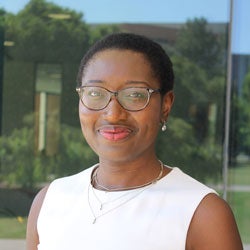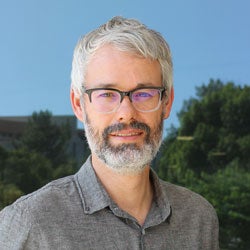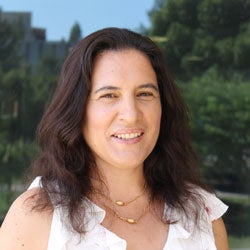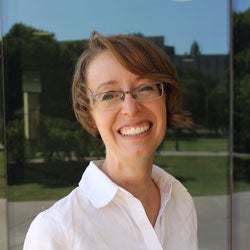The School for the Future of Innovation in Society at Arizona State University welcomes four new faculty members this semester whose varied backgrounds will expand the expertise, research interests and academic offerings of the school. Get to know the newest members of the team.
Timiebi Aganaba-Jeanty
Assistant professor in the School for the Future of Innovation in Society with a courtesy appointment at the Sandra Day O’Connor College of Law
Timiebi Aganaba-Jeanty is an expert on all things space law. When she was 15, her father took her to the NASA Space Center in Houston — where she decided she wasn’t a space geek at all. In fact, she found all that space stuff rather boring. But that all changed when she went to Nigeria for law school. After finishing their degrees, graduates must complete one year of service for the country at an organization that is randomly assigned, and by chance, Aganaba-Jeanty was posted at the Nigerian Space Agency.
“It was exciting because I got to be a part of Nigeria’s nearly brand new Department of Space Law,” she said. “While working there, I realized that this was a really cool topic, and I’d like to do further study on this.”
Aganaba-Jeanty’s research explores participation mechanisms for global space governance and environmental governance. Her goal is to find ways to account for different perspectives and the participation of diverse actors in decision making. “(Theoretically), there’s no sovereignty in space. If there’s no sovereignty in space, no one is more important than anyone else. But, clearly, there is a power dynamic because you have the NASAs of the world who can spend $20 billion a year, but the Nigerian Space Agency is working with a budget of less than $100 million,” she said. “I look at this in the context of space by looking at how non-classic actors can participate in space exploration, and particularly, what does it mean to be an aspirant space actor? How are such actors integrated into the space exploration endeavor?”
Before coming to School for the Future of Innovation in Society, Aganaba-Jeanty worked for the Canadian Space Agency while she was a PhD candidate at the Institute of Air and Space Law at McGill University. She also served as executive director for World Space Week, associate chair of the Space Policy, Law and Economics Department at the International Space University in Cork, Ireland, and was a postdoctoral fellow at the Centre for International Governance Innovation. In 2017, she was the recipient of a Space Leaders Award by the International Astronautical Federation and her doctoral research received the George and Ann Robinson Award for advanced research capabilities.
When asked what impact she wanted to have on the world, she said, “I think that there is so much out there ... to make us feel like we can’t do things, that we shouldn’t put ourselves out there. We’re so scared of the ramifications of putting our hands up and having an opinion,” she said. “But you should act the way you want to be, not necessarily the way you feel that you are. The biggest thing that I want to do is really show people what’s possible.”
Kirk Jalbert
Assistant professor in the School for the Future of Innovation in Society with a joint appointment in the School of Computing, Informatics, and Decision Systems Engineering
“You can’t understand complicated issues from a one-dimensional view,” said Kirk Jalbert, who likens himself to a utility player on a baseball team: trained in a variety of disciplines and acting as a “boundary bridger” between different areas of research.
“The majority of the projects that I’ve worked on in the last five years have been because the phone rings, and somebody says, ‘Hey, I’ve got this really interesting problem, what do you think about it?’ And then I say, 'Well, I don’t know, let me look into it!'” he said. “People don’t generally go looking for help unless they haven’t been able to find answers elsewhere, and that to me signals that there’s a really interesting place for research.”
Jalbert attended Rensselaer Polytechnic Institute where he got his PhD in science and technology studies. It was there that he first became interested in citizen science and the maker movement. Specifically, he wanted to learn more about what it meant that people were making new technologies in an attempt to improve the way that these things worked.
“I realized that the maker movement is critiquing the standard ways in which we build technology,” he said. “And this interest led me into becoming part of a study on citizen science, water monitoring and hydraulic fracking.”
After that, Jalbert worked in the nonprofit sector with FracTracker Alliance. There, he helped with facilitating data gathering and transparency projects in partnership with concerned citizen groups, making sense of their relationships with the energy industry — particularly in the context of debates about the impacts of shale gas extraction and proposed pipeline projects.
However, Jalbert says he always knew he would find his way back into academia.
“I knew I wanted to go back into an academic community, it just needed to be the right one,” he said. “Some of my colleagues were in institutions that didn’t value applied interventionary research, working with community partners, or felt that they shouldn’t work on things that were potentially sensitive subjects, so I had to find a place that would let me do all of those things.”
He says he found that place here at the School for the Future of Innovation in Society. Now, he is excited to be able to use the wealth of resources, skill sets and collaborative efforts that ASU offers to help solve problems within the communities he works with.
Katina Michael
Professor in the School for the Future of Innovation in Society and School of Computing, Informatics and Decision Systems Engineering
Katina Michael discovered something important when she started walking.
“Everything happens in a flash, life happens in a flash. If we don’t stop this quick way of living, then we’re on this treadmill of constant flashes,” she said. “But if you stop and just walk — without headphones, without your cell phone — you hear people and see people. The risk of looking up and engaging with the world means that you might have to face the problem.”
This idea of foregoing our comforts and our technologies in favor of slowing down and reflecting on life is the cornerstone of Michael’s work: “We’re giving over control, to some degree, to the technology. And in doing so, we’re not developing the self. Technology can sometimes be used as an excuse to ignore the inward process of human development.”
She researches predominantly in the area of emerging technologies and has secondary interests in technologies used for national security and their corresponding social implications. Like many of her colleagues at the School for the Future of Innovation in Society, Michael realizes the importance of examining the risks and potential consequences of emerging technology and science.
She has held visiting academic appointments at Nanjing University in China and the University of Southampton in the U.K. and has taught at the Singapore Institute of Management, as well as overseeing University of Wollongong in Australia engineering and information science courses in eight campuses in five countries. In 2017, Michael was awarded the Brian M. O’Connell Distinguished Service Award from the Institute of Electrical and Electronics Engineers Society for the Social Implications of Technology. She is the founding editor-in-chief of the Institute of Electrical and Electronics Engineers Transactions on Technology and Society, which will be launched in 2020.
Before finding her way to the School for the Future of Innovation in Society, Michael served as associate dean international at the University of Wollongong, where she was employed in the faculty of engineering and information sciences.
As for why she decided to pack up and move to the States to join the faculty at SFIS, she said: “I think I was always meant to be here. I grew up in Tempe, New South Wales,” she laughed. “But aside from that, it was the people here. And I’d been in Wollongong working at the same campus for 17 years, so for me to leave, it had to be something really special.”
Christy Spackman
Assistant professor, jointly appointed between the School for the Future of Innovation in Society, and the Arts, Media, and Engineering Departments
A dish from a world-renowned, three-Michelin-star restaurant and a bowl of Kraft mac and cheese have a lot more in common than one might think. So Christy Spackman wants to know: Why do people spend hundreds of dollars at high-end restaurants to eat weird, elaborate dishes like parmesan marshmallows or melon caviar, but turn their nose up at mass-produced cheese pasta product, which uses similar techniques of molecular gastronomy to create?
“I think about the ways that the body’s smell or taste functions in the world, how technology and science are always shaping those information streams and what that means for our relationships with each other and with the environment,” she said. “We’ve had this huge increase in the scientific ability to identify and subsequently mask flavors and odors. How has that shifted our relationship with the environment if we’re no longer aware of the tastes and odors of our food? I’m really interested in these forms of sensory ignorance vs sensory knowledge and how that acts on our lives.”
Before finding her place here at the School for the Future of Innovation in Society, Spackman got her PhD in food studies from the Department of Nutrition, Food Studies, and Public Health at New York University, and has worked with companies such as Kraft Foods, Fine & Raw Chocolate Factory, University of Chicago Medical Center and Eau de Paris on product development, nutrition and health research and marketing and communication as well as offering consulting advice to food startups. She also attended culinary school, where she discovered her deep love for food science.
When asked why she chose to teach and conduct her research here at the School for the Future of Innovation in Society, she cited the interdisciplinary nature of the program. As someone who considers her background to be rather “convoluted”, Spackman says it was refreshing to find a place where her history and interests are celebrated.
“Someone here at ASU had told me, ‘Coming here is like having someone strap a rocket booster to your back. You can do anything … the problem is they forgot to give you the stop button,’” she laughed.
Written by Madelyn Nelsen
Top photo: New faculty members (from left) Katina Michael, Kirk Jalbert, Timiebi Aganaba-Jeanty and Christy Spackman.
More Science and technology

ASU and Deca Technologies selected to lead $100M SHIELD USA project to strengthen U.S. semiconductor packaging capabilities
The National Institute of Standards and Technology — part of the U.S. Department of Commerce — announced today that it plans to award as much as $100 million to Arizona State University and Deca…

From food crops to cancer clinics: Lessons in extermination resistance
Just as crop-devouring insects evolve to resist pesticides, cancer cells can increase their lethality by developing resistance to treatment. In fact, most deaths from cancer are caused by the…

ASU professor wins NIH Director’s New Innovator Award for research linking gene function to brain structure
Life experiences alter us in many ways, including how we act and our mental and physical health. What we go through can even change how our genes work, how the instructions coded into our DNA are…




